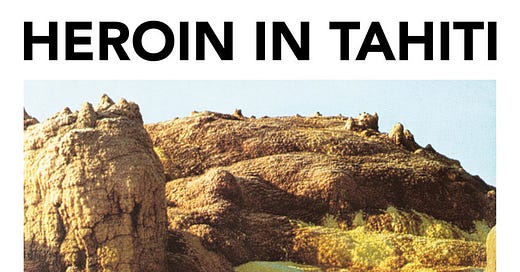Genre of the Day - Psichedelia occulta italiana
Album of the Day - Sun and Violence by Heroin in Tahiti (2015)
As an act of combining sound and idea, the scope of music is filled with idiosyncrasies. It doesn’t often get quite as idiosyncratic as in the genre name Italian occult psychedelia, though. It certainly cultivates a niche from the jump… Upon deeper thought, it tracks that Italy would possess a penchant for occult takes on psychedelia: the surreal, vivid hellscapes of the most renowned Italian literary work, Dante’s Inferno, and the contrast between the weighty history of the Papacy in Rome overseeing hundreds of millions of Catholics and surrounded by a relatively irreligious society (23% of Italian Christians say religion is very important in their lives, compared to 68% of their American counterparts).
There’s a comparative notion that the looming fear of foreign visitors to America is of its impossibly sprawling size, whereas Europe’s tangible, visually evident thousand of years of history is the American visitor’s cause of anxiety. Psichedelia occulta italiana (POI) scours this oppressive nostalgia, combing through and grabbing dusty musical memories.
It’s only right that the same city that houses the Vatican would inspire the phantom musical journeys of POI. Bands in the music scene of artsy eastern side Rome dabbling in a series of P-rocks (post-rock, psychedelic rock, prog rock) and texture-constructing drone and ambient began gravitating towards collages that were mysterious and ritualistic. They began forming an interpretation of psychedelia that was deeply rooted in Italian memories and tangible places and weaved a variety of musical sinews together to do so.
One form of kindling for POI’s flame was in the sheer surrealism of spaghetti westerns of the 1960s, which took over Italian film as historical epics fell stagnant. Directors’ fantasies of the American heroes of the frontier scenes amazed audiences. Those scenes were filmed on the dry, rural swathes of southern Italy, seen by Italians as a destitute place to leave. The fact that those same landscapes held freedom, masculinity, and opportunity in the context of an American storyline is one underrunning distinctly Italian eccentricity in POI. More directly, musicians drew from spaghetti western’s soundtracks spearheaded by composer Ennio Morricone arranging ominous bells, frantic guitar, and drama-laden horns that sound as wide and cunning today as they did in the ‘60s. A similar sense of multimedia inspiration is drawn from the cinematographic excellence of ‘70s murder mystery giallo films that helped inspire slashers through their terrifying murderous intrusions into idyllic on-screen lives of young Italians, made all the more unsettling by the peaceful, lounge-soft compositions soundtracking all that blood. The eclectic scene soaked those wistful memories in ominous ambient and drone sound textures driven by guitar melodies, and niche labels sprung up to support them. POI even had a festival running for a few years.
Rather than a psychedelic substance unfolding in color and mind-bending thought, Heroin in Tahiti’s POI interpretations aim straight for paranoia and memory. Their 2015 album “Sun and Violence” is like a strung-out, woozy collapse on the beach alone, a sinister shadow cast over the beach excursions that typify an Italian summer if my favorite vlogger is any indication. Ghastly, metallic flute seeps into opening “Salting Carthago” over ambient wave sounds, like water rushing into a sinking catamaran. The urgency is upped by a ritualistic percussive march and decaying guitar melodies. Distant, barely perceptible audio samples in “500 Cells” function like far-away sounds through a state of half-consciousness before a transcendental guitar groove emerges. The twelve minute suite of “Continuous Monument” encircles the weary beachgoer with birds and a threatening, hand-patted drum build-up into haunting drone tones and, perhaps for a psychedelic checkmark or simply for a moment of respite, sitar. The misshapen, extraterrestrial chimes soundtracking the haywire “Wireless Telegraphy Mirage” sweep an unsuspecting and at this point scared listener into the insistent race of “Zatlath Aithas.” Its most poignant moments are in invoking the flanging guitar and bells of spaghetti westerns, such as on the lonesome “Black Market” but especially stirring over “Elba[‘s]” softly licking flames reminiscent of the promise of destruction by Italy’s many erupting and equally dangerous dormant volcanoes. The slow fadeout “Costa Concordia” reflects the slow yet anguished 2012 sinking of the titular cruise ship that killed 32 people in an incident that many Italian commentators pointed to as representative of inaction and cowardice in political life. It’s an uncanny, spectral vision of psychological decay and ruminations under the sun, but it’s nonetheless as rich as the influences that yield its immersive interpretation of Italian life and postmodern music.






Like it. Very liminal and cerebral! Love very niche Italian genres- like “Giallo”. Not music, but film (with matching music!!)
Very groovy article and album (playing it now). There are some definite Spacemen 3 influences on those droning chords that linger for as long as they can sustain them.